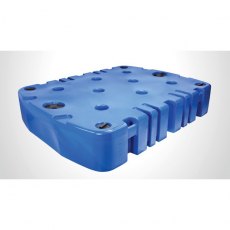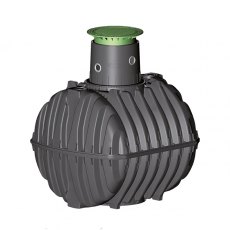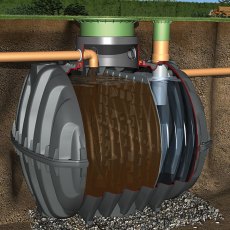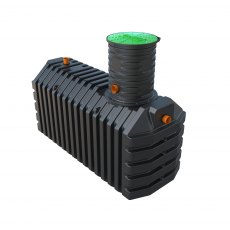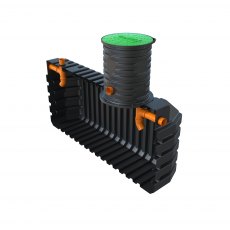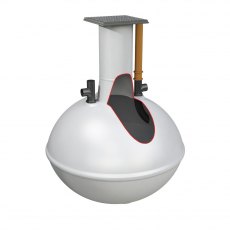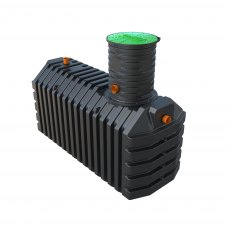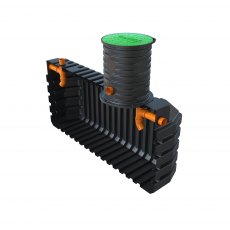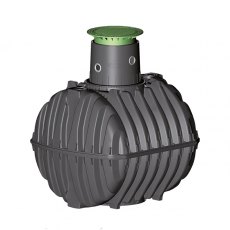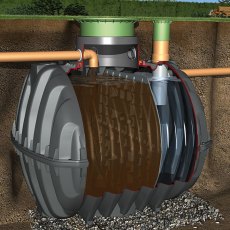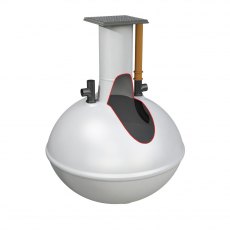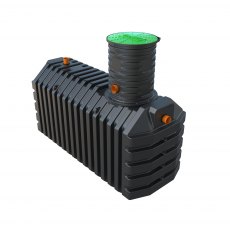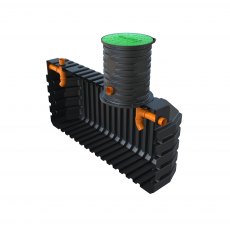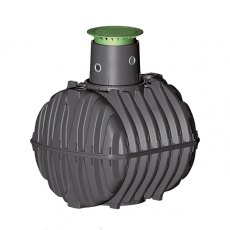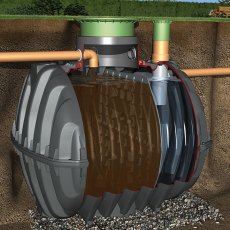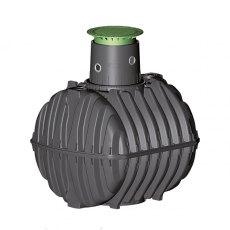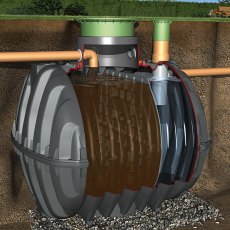Featured Products
(€1,838.85 inc VAT)
Septic Tanks
Septic tanks can treat and discharge the liquid part of the sewage. Waste enters the first tank where gravity separates the liquids from the solids. The liquid effluent flows out of the tank onto land, where it is cleaned as it percolates through the soil. Some of the sunken solids, or ‘sludge’, is broken down by natural bacteria but the rest will need to be taken away by lorry. Septic tanks are suitable for single houses or small developments, but you’ll also need a drainage field that is porous enough to allow the waste to percolate through.
Septic tanks systems are a small-scale sewage treatment works designed to treat wastewater and return it to the environment, while storing the solid waste (sludge). You’ll need to register with the Environmental Protection Agency if your property uses a septic system and you are responsible for ensuring that your system is functioning properly. That is why supplying our customers the highest-quality septic tanks is of paramount importance to us.
Advantages of a septic tank
- Relatively low installation cost
- Relatively low cost to run
- Only require emptying (or ‘desludging’) once or twice a year
Disadvantages of a septic tank
- Your ground must be porous enough to allow the liquid effluent to discharge
- New laws state septic tanks can no longer be discharged into a watercourse
How a septic tank system works
Wastewater enters the septic tank through the inlet pipe. Heavy waste sinks to the bottom and lighter waste floats to the top, while the effluent remains between these two layers. As more and more waste flows into the septic tank, the effluent is pushed through the outlet pipe into a closed network of perforated pipes, filtering through the bed and into the soil below. We know the importance of using high-quality septic tanks and only stock brands we trust, including Klargester and Graf
How often do I need to service my treatment plant?
It is advisable to get the buildup of sludge in your system cleared and the mechanical and electronic components serviced every six to twelve months.
Maintenance
Your septic tank will need to be emptied periodically to remove the sludge that builds up over time. The frequency will depend on the number of people using the system, but it’s usually done every six to twelve months. Items such as nappies and sanitary towels will quickly clog your septic tank (and most other waste treatment systems) so dispose of these with your rubbish rather than flushing them. Fat and grease can also create build up in the pipes and septic tank. The system relies on a delicate ecological balance so be careful about introducing hazardous chemicals into the system, such as varnish or paint thinners. A reasonable amount of domestic cleaning products or household detergents will be fine.
Septic Tanks FAQs
How will I be able to tell that my septic tank is full?
Recognising signs early that your septic tank is full and in need of emptying is essential to maintaining the health of your septic tank system. One noticeable sign that your septic tank may be getting full is slow drainage throughout your plumbing fixtures. You might notice that sinks, showers, and toilets are slower to drain than usual. Water may back up or gurgle in drains, indicating that your septic system is struggling to handle the volume. As the tank fills, it has less capacity to contain and treat the waste properly, so you may notice foul odours in and around your property. The most inconvenient and obvious sign of a full septic tank is sewage backups inside your home. If toilets or drains are consistently backing up or becoming clogged, it's a clear indication that your septic tank is overloaded and needs immediate attention.
Another indicator is a vibrant, lush patch of grass or vegetation over your drain field. When the tank reaches its capacity and cannot properly process wastewater, the excess effluent may fertilise the surrounding soil, causing grass and plants to thrive more than usual. Standing water or soggy areas in your garden, especially around the septic tank or drain field, can also signal that your septic tank is full or experiencing issues. This pooling occurs when the tank is unable to absorb and distribute wastewater efficiently. If you notice these wet areas persisting, it's essential to address the situation promptly to prevent further damage to your septic system.
How long do septic tanks usually last?
Septic tanks, when properly maintained, can serve you well for several decades. A well-constructed septic tank can last anywhere from twenty to forty years or even longer, making it a worthwhile investment for your property. But to maximise the lifespan of your septic tank, you should schedule routine inspections and emptying. This preventative maintenance helps remove accumulated sludge and scum, preventing them from clogging the system and causing damage. Neglecting these maintenance tasks can drastically reduce your septic tank's lifespan, leading to costly repairs or replacements sooner than expected. You should avoid flushing non-biodegradable items, excessive grease, or chemicals down the drain, as these can harm the system and lead to premature deterioration. Educate yourself and your household on septic-friendly practices to ensure your system remains in good working condition for many years to come.
The type of soil and climate in your area may also impact the lifespan of your septic tank. In areas with dense clay soils, for instance, the tank may fill up faster. Harsh weather conditions can also affect the tank's structural integrity, so it's essential to take these factors into account and adapt your maintenance schedule accordingly.
Can rainwater go into septic tank?
Rainwater must not enter your septic tank. Make sure that the downpipes and drains that carry rainwater are not connected to your septic tank. Your tank is sized to deal with a specific volume of wastewater – ensuring the sewage remains in the septic tank long enough for all the solid waste to settle at the bottom. If rainwater enters the tank, the flow rate increases, and adequate settlement does not occur. As a result, the effluent would contain so many suspended solids that it would very quickly compromise the soakaway, and the contents of the tank will be washed out before they’ve been broken down, causing pollution and health hazards. Septic tanks and sewage treatment systems must only be connected to grey and black water drains, such as toilets, sinks, showers, baths, washing machines, and dishwashers. If you’re looking to manage rainfall and surface water, consider installing a rainwater harvesting system.
Can I sell a house without a septic tank?
If you sell a property with a septic tank that discharges directly into a watercourse, you should agree with the buyer who will be responsible for replacing or upgrading the treatment system. You should agree this as a condition of sale. You must also provide the buyer with a description of the treatment plant and drainage system, the location of the main parts of the treatment plant, the drainage system and discharge point, how the treatment plant should be maintained, and any details of any changes made to the treatment plant and drainage system while you were the owner of the property. You’ll also want to give the new owners the maintenance manual and maintenance records if you have them.
Selling a property without a septic tank installed or with a septic tank that is non-compliant with the government’s general binding rules will not only detract potential buyers but may also be subject to enforcement action by the Environment Agency. You can find details of the latest regulations surrounding septic tanks on the government’s website here.
What is the best type of septic tank for a house?
A septic tank is the first stop for the wastewater that leaves your home. The waste is held in the tank, where it goes through the process of separating the solids from the liquids before filtering water into your drainage field. The best type of septic tank for your house will depend on several variables – from your property’s square footage to the number of bedrooms and number of people using the system.
The larger your house, the larger septic tank you’ll probably need. And the more occupants in your home, the bigger the tank you’ll need. A small septic tank will probably suffice if you only have two people living in your property – but if you have a large family, of five or more people living in your home, you’ll need a larger septic tank to manage all the household waste hygienically and effectively.
It's also important to consider the following: Do you have two kitchens? Or multiple bathrooms and ensuites? Do you have, or plan to have, a hot tub or a swimming pool? All of these will increase the demand on your septic tank.
Due to the new regulations, do I need to upgrade to a Sewage Treatment System?
You would only need to upgrade your septic tank if the run off discharges to a water course.
Standard soak aways are still legal.
How often should I empty my septic tank?
Your tank should be emptied once a year so that you do not risk a build up of sludge which can lead to problems with your system. The company you use to empty your septic tank must be registered to do so.
Does my septic tank need a permit?
Owners of properties connected to larger on-site systems where the discharge is in excess of 5 cubic metres per day do not need to register (i.e sports clubs, pubs, hotels, guesthouses and other businesses). Instead such systems may require a licence from the relevant local authority under Section 4 of the Water Pollution Act 1997.
Do septic tanks need servicing?
You should have your septic tank system regularly maintained in accordance with the manufacturer’s instructions. If these are not available, ask your local maintenance company for advice. This will save costly repairs or replacement of the sewage system in the long term.
What do I need to look out for when buying a septic tank?
When buying a septic tank is good to consider the following questions:-
- Is a septic tank the correct solution to meet your requirements? It may be that instead of a septic tank, you need a sewage treatment plant.
- Have you undertaken a Percolation Test? A percolation test is a method of assessing how much water can drain away through your plot’s subsoil. It is performed by excavating a small area and monitoring the time taken for the water to drop in minutes per inch. The final decision will often be determined by drainage options – i.e. do you have access to mains drainage or a water course?
What do I need to consider if I am buying/ selling a property with a septic tank?
Homeowners with septic tanks that discharge directly into ditches, streams, canals, rivers, surface water, drains or any other type of water course will need to replace or upgrade their drainage either when they sell their property or as soon as possible.
What are some things that should not be put into the septic tank system?
- Don’t flush anything other than bodily waste and toilet paper down the toilet
- Don’t dispose of grease or oil down any drain – wipe out pans and pour fat into a container to be disposed of in the bin
- Don’t put paints, solvents or chemicals down the drain
- Don’t try to unblock pipes with caustic soda or drain cleaners. Try boiling water instead
- Don’t connect rainwater pipes to your septic tank
What are your options when it comes to the Septic Tank Regulations
If your current system discharges directly into a water course, you will need to upgrade your system. To go through your options give us a call, and we can talk you through the various options.
My old tank needs some parts replacing do you offer this?
Yes we offer the full range of Klargester replacement parts, please see our wastewater accessories category
What checks should I make on my septic tank system?
If your septic tank system is in good working order you should have the following:
- Your household drainage should be quick to clear, and toilets should not be backing up
- There should be no smell from your tank and the cover should be accessible and well fitting
- The soak away should be dry not swampy, smelly or have prolific grass growth
- A pale liquid with little or no smell should come from the discharge pipe. It should not be dark, smelly or contain solids
- Makes sure to keep deep-rooted trees and plants at least 30 m away from your system. Keep the grass nearby short.
If any of the above is showing signs that your septic tank system is not in proper working order, you must get it repaired or replaced by a credited installer.
How to Discharge Waste from Septic Tanks
There are 3 options available:
(1) Connect to a main sewer if possible
(2) install a drainage field or
(3) install a sewage treatment plant which treats the wastewater, producing a clear overflow that is environmentally friendly and suitable for discharging.
To see our full range of sewage treatment plants click here
Why should I look after my septic tank system?
If your septic tank system is not in good working order it can be a serious risk to both health and the environment. You also have a legal responsibility to maintain your septic tank system. In looking after your septic tank system, it will have to be emptied less frequently, saving you money. A septic tank system can also be costly to replace if it fails.
Do I need to register my tank?
Yes you need to register your septic tank with your Local Authority – click here to register https://www.protectourwater.ie/. There is a charge of €50 to register.
Is the landlord responsible for emptying the septic tank?
If you own a property which you rent, or you are a tenant yourself, it can become a little less clear who has the responsibility to empty the septic tank. Maintenance and responsibility can be written into the tenancy agreement. If you are a landlord renting out a property with a septic tank you may need to put measures in place if you want the tenant to take responsibility for the septic tank. You may need an inspection or service after the end of any tenancy period. As a tenant, if it is written into the tenancy agreement that you have responsibility for the septic tank, you might also want to insist upon an inspection to ensure you aren’t inheriting any issues you would then be liable to pay for is one way to do this. Checking the schedule of maintenance and the obligations is another before any serious issues can occur. Following the guidelines of the septic tank is important too.
How far should my septic tank be from the house?
Septic tanks should be at least 7 metres away from any dwelling. They should also be located within 30 metres of an access point so that the tank can be emptied.
Septic tanks vs cesspools, which is best?
If you do not have sufficient area required to discharge the run out from a septic tank, you would need a cesspool which requires emptying on a 40 day cycle. Please contact us for help if required.

 Login
Login
